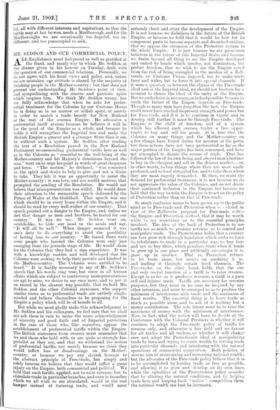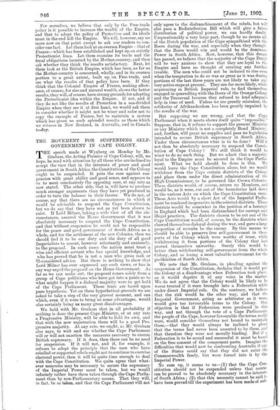MR. SEDDON AND OUR COMMERCIAL POLICY. A LL Englishmen must feel
proud as well as gratified at the frank and manly way in which Mr. Seddon, at the dinner given in his honour on Tuesday, dealt with the question of our commercial relations. Personally, we do not agree with his fiscal views and policy, and, unless we are mistaken, [ear attitude is shared by the majority of thinking people in the Mother-country ; but that does not prevent our understanding Mr. Seddon's point of view, and sympathising with the sincere and patriotic spirit which inspires him. We think Mr. Seddon wrong, but we fully acknowledge that when he asks for prefer- ential treatment for the Colonies by our Customs House he is doing so in no narrow or selfish spirit, or merely in order to snatch a trade benefit for New Zealand or the rest of the oversea Empire. He advocates a preferential tariff system because he believes it will be for the good. of the Empire as a whole, and. because he holds it will strengthen the Imperial ties and make the British Empire a greater and a stronger State than it can be without such a system. Mr. Seddon, after reading the text of a Resolution passed. in the New Zealand. Parliament recommending preferential tariffs here as well as in the Colonies as "essential to the well-being of the Mother-country and his Majesty's dominions beyond. the seas," went onto urge his point in words of great eloquence and. force. "The motion," he declared, "was conceived in the spirit and desire to help to give, and not a desire to take. They felt it was an opportunity to assist the Mother-country ; it was love, and not sordid. motives, that prompted the sending of the Resolution. He would not believe that misrepresentation was wilful. He would draw their attention to the memorable speech delivered by the Prince of Wales at the Guildhall. That speech was one which should. be in every home within the Empire, and it should be read by every well-wisher of our country. That speech pointed out a danger to the Empire, and, unless we met that danger as men and brothers, he feared. for our country." It was no use, Mr. Seddon went on, ostrich-like, to hide our head. in the sands and. say, "It will all be well." When danger menaced. it was one's duty to do everything to avoid the possibility of lasting loss to our country. "He feared there were some people who fancied. the Colonies were only just emerging from the juvenile stage of life. He would claim for the Colonies that they had a ripe experience. It was with a knowledge mature and. well developed that the Colonies were seeking to help their parents and kindred in the Mother-country. The Colonies were entitled. to be heard." It is hardly necessary to say of Mr. Seddon's speech that his words ring true, but since in all human affairs which are subject to controversy misrepresentations are apt to arise, we desire to say once more, and. to put it on record in the clearest way possible, that we hold Mr. Seddon. and the other Colonial statesmen who support similar views as to preferential trade are entirely single- minded and believe themselves to be proposing for the Empire a policy which will be of benefit to all.
But while we most gladly make this acknowledgment to Mr. Seddon and his colleagues, we feel sure that we shall not ask them in vain to make the same acknowledgment of sincerity and good faith and. of Imperial patriotism in the case of those who, like ourselves, oppose the establishment of preferential tariffs within the Empire. The British statesmen from oversea must remember that we and those who hold with us are quite as strongly Im- perialist as they are, and. that we withstand the notion of preferential tariffs, not merely because we think they would inflict loss or disadvantage on the Mother. country, or because we pay any slavish homage to the abstract principle of Free-trade, but simply and solely because we believe that they would inflict a great injury on the Empire, both commercial and political. We hold that such tariffs, applied, not to raise revenue, but to stimulate trade in particular branches, and even in branches which we all wish to see stimulated, would in the end hamper instead of fostering trade, and would most seriously check and stunt the development of the Empire. It is not because we disbelieve in the future. of the British Empire, or because we hold that it would be best for its component parts to become-separate and disunited entities. that we oppose the extension of the Protective system to the whole Empire. It is just because we ate passionate believers in the future of this Imperial State, and. because we desire beyond all thing to see the Empire developed and united by bonds which involve, not domination, but perfect freedom, that we wish to see the Empire saved from the risk of being strangled in the meshes of a Zoll- verem, or Customs Union, imposed, not to make trade freer and wider, but to force it into special channels. If it were a question as between the claims of the Free-trade ideal and of the Imperial ideal, we should not hesitate for a moment to choose the ideal: of the unity of the Empire. But no such choice is necessary, or indeed possible, because in truth the future of the Empire depends on Free-trade. Though so many men have forgotten the fact, the Empire could never have reached its present strength and power but for Free-trade, and if it is to continue in vigour and to develop still further it must be through Free-trade. The Empire is the child. of freedom, and of a system which has allowed. each oversea trader a free oppor- tunity to buy and. sell his goods. it is true that the Colonies on many things and the Mother-country on a few things have levied duties for revenue at the ports, but these actions have not been preferential as far as the major portion of the Empire has been concerned, and. have not attempted to dictate the course of trade. That has followed the law of its own being, and obeyed man's instinct to buy in the cheapest and sell in the dearest market,—or, in other words, to buy things where they are most easily produced, and so least strugglod for, and to take them where they are most eagerly demanded. If, then, we resist the demand for preferential treatment, it is not because we do not appreciate the value of the Colonies, and do not desire their continued. inclusion in the Empire, but because we hold that the way to ruin the Empire is to act on the policy of Protection rather than on that of Free-trade.
So much confusion seems to have grown up in the public mind. as to Free-trade and. Protection when Cu Iiidered in view of the Zollverein proposal for Free-trade within, the Empire and Protection without, that it may be worth while to say something as to the essential principles involved. The idea at the back of Protection is to use tariffs not so much to produce revenue as to control and manipulate trade. The Protectionist holds that a country can best grow rich through legislation which seeks to force its inhabitants to trade in a particular way, to buy here and not to buy there, which penalises trada when it tends to grow up in one place and artificially encourages it to grow up in another. That is, Protection refuses to let trade alone, but insists on confining it in, and leading it through, certain fixed channels. The Free-trader, on the other hand, holds that the one and. only useful function of a tariff is to raise revenue. Except in so far as it produces revenue, a tariff is a pure evil and injures trade. Tariffs are necessary for revenue purposes, but they must in no case be inspired by any other intention, and must be arranged so as to produce the minimum of interference with trade and the maximum of fiscal results. The essential thing is to leave trade as much as possible alone, and to ask of it nothing but a money contribution. The sole intent must be to raise the maximum of money with the minimum of interference. Now, in fact, what the nation will have to decide at the Conference with the Colonial Premiers is whether it will continue to adopt the Free-trade policy of tariffs for revenue only, and otherwise a fair field and no favour for all trades and. all traders, or whether it will change over and adopt the Protectionist ideal of manipulating trade by laws and. trying to create wealth by forcing trade into particular channels and interfering with the natural operations of commercial competition. Both policies, of course, aim at maintaining and increasing national wealth ; but the advocates of the Free-trade policy believe that it is to be accomplished by leaving trade as free as possible, and. allowing it to grow and develop on its own lines, while the upholders of the Protectionist policy consider that by altering the natural conditions, and by helping trade here and keeping back " unfair " competition there the national wealth can best be increased. For ourselves, we believe that only by the Free-trade policy is it possible to increase the wealth of the Empire, and that to adopt the policy of Protection and its ideals must in the end kill the Empire. We will, however, say no more now on that point except to ask our readers to con- sider one fact. Let them look at an oversea Empire—that of France—which has been established and kept up on strictly Protectionist lines. Let them examine its trade and the fiscal obligations incurred by the Mother-country, and then ask whether they think the results satisfactory. Next, let them look at the British Empire, which has been, as far as the Mother-country is concerned, wholly, and in its oversea portion to a great extent, built up on Free-trade, and see what the results of that policy have been. If they think that the Colonial Empire of France, making allow- ance, of course, for size and natural wealth, shows the better results, they will, of course, have strong grounds for adopting the Protectionist idea within the Empire. If not, and if they do not like the results of Protection in a sea-divided Empire when they see it at first hand, we would ask them to consider whether it might not be wiser and safer not to copy the example of France, but to maintain a system which has given us such splendid results as those which we witness in New Zealand, in Australia, and in Canada to-day.







































 Previous page
Previous page